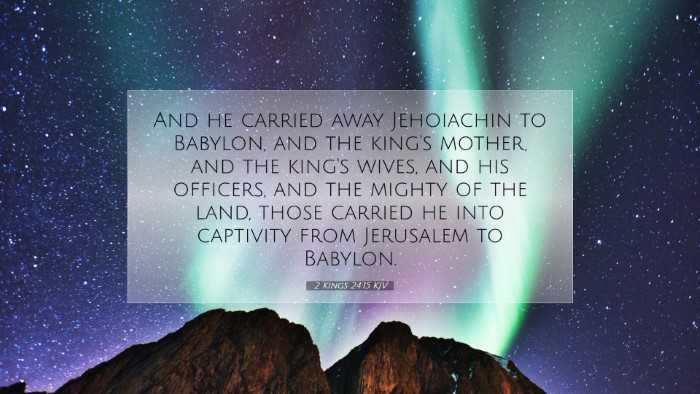Old Testament
Genesis Exodus Leviticus Numbers Deuteronomy Joshua Judges Ruth 1 Samuel 2 Samuel 1 Kings 2 Kings 1 Chronicles 2 Chronicles Ezra Nehemiah Esther Job Psalms Proverbs Ecclesiastes Song of Solomon Isaiah Jeremiah Lamentations Ezekiel Daniel Hosea Joel Amos Obadiah Jonah Micah Nahum Habakkuk Zephaniah Haggai Zechariah Malachi2 Kings 24:15
2 Kings 24:15 KJV
And he carried away Jehoiachin to Babylon, and the king's mother, and the king's wives, and his officers, and the mighty of the land, those carried he into captivity from Jerusalem to Babylon.
2 Kings 24:15 Bible Commentary
Commentary on 2 Kings 24:15
Verse Context: 2 Kings 24:15 states, "And he carried away Jehoiachin to Babylon; and the king's mother, and the king's wives, and his officers, and the mighty of the land, those carried he into captivity from Jerusalem to Babylon." This verse marks a pivotal moment in the history of Judah, capturing the essence of the nation’s decline and the consequences of disobedience towards God.
Overview of the Historical Context
The passage alludes to the Babylonian captivity, a significant event for the Jewish people. This verse is part of a broader narrative that illustrates God’s judgment against Judah due to persistent idolatry and moral decay. The carrying away of Jehoiachin marks the end of the Davidic line of kings in Jerusalem.
The Significance of Jehoiachin's Captivity
- Political Implications: Jehoiachin's capture signifies the total domination of Babylon over Judah. This defeat demonstrates the fulfillment of prophetic warnings issued by Jeremiah and others.
- Theological Reflection: The captivity serves as a divine judgment reflecting God's holiness and justice. It emphasizes the serious consequences of turning away from God's covenant.
- Messianic Foreshadowing: Jehoiachin's captivity serves as a backdrop for the eventual emergence of Jesus Christ, who comes from the line of David, illustrating hope amid despair.
Insights from Renowned Commentators
Matthew Henry
Matthew Henry’s commentary highlights the theme of judgment and grace. He emphasizes that God’s hand is evident in the providential circumstances leading to the captivity. Henry writes:
“The carrying away of the king and the nobility into Babylon was a token of God’s displeasure against them. The king’s mother and wives were included as those who shared in the sins of the nation. Their removal was both a punishment and a means to preserve a remnant of faith.”
Albert Barnes
Albert Barnes provides a thorough examination of the socio-political effects of this exile. He notes that:
“Jehoiachin’s removal disrupted the royal lineage in Judah and created a vacuum of leadership. This act was not merely political; it exemplified the gradual fulfillment of prophecies regarding Jerusalem’s downfall.”
Furthermore, Barnes suggests that the inclusion of the king's family rationalizes the severe consequences of familial and national sin.
Adam Clarke
Adam Clarke, in his exposition, reflects on the emotional and spiritual ramifications of the exile. He draws attention to the broader implications of this event:
“This captivity represented not just a physical relocation but a spiritual exile for the people of God. They had been chosen as His people, and now, through disobedience, they found themselves in a foreign land, far removed from the temple and the presence of God.”
Theological Themes
- Disobedience and Judgment: The fundamental theme in 2 Kings 24:15 is the consequence of disobedience to God's law. It serves as a stark reminder of the limits of God’s patience and the inevitability of His judgment.
- Divine Sovereignty: God’s sovereignty is affirmed through the actions of Babylon. Though the exile seems a tragic loss, it is part of God’s redemptive narrative.
- Hope in Despair: Even in judgment, God provides hope. The future restoration prophesied by Jeremiah reflects God's nature and intent to redeem His people.
Practical Applications
For pastors, students, theologians, and scholars, this verse offers profound lessons:
- Call to Repentance: Just as Judah ignored the warnings of their prophets, modern believers are called to heed the voice of God in contemporary society.
- The Danger of Familial Influence: The inclusion of jehoiachin's family emphasizes the importance of leading one's household in the ways of the Lord.
- The Necessity of Hope: In times of national and personal crisis, believers are reminded of God’s ultimate plans for restoration and hope, often taking form in unexpected ways.
Conclusion
2 Kings 24:15 is not merely a historical account; it serves as a sobering reflection on God's justice in response to human actions. The insights provided by Matthew Henry, Albert Barnes, and Adam Clarke collectively enrich our understanding of this passage, emphasizing the profound implications of leadership, sin, and the promise of redemption.


